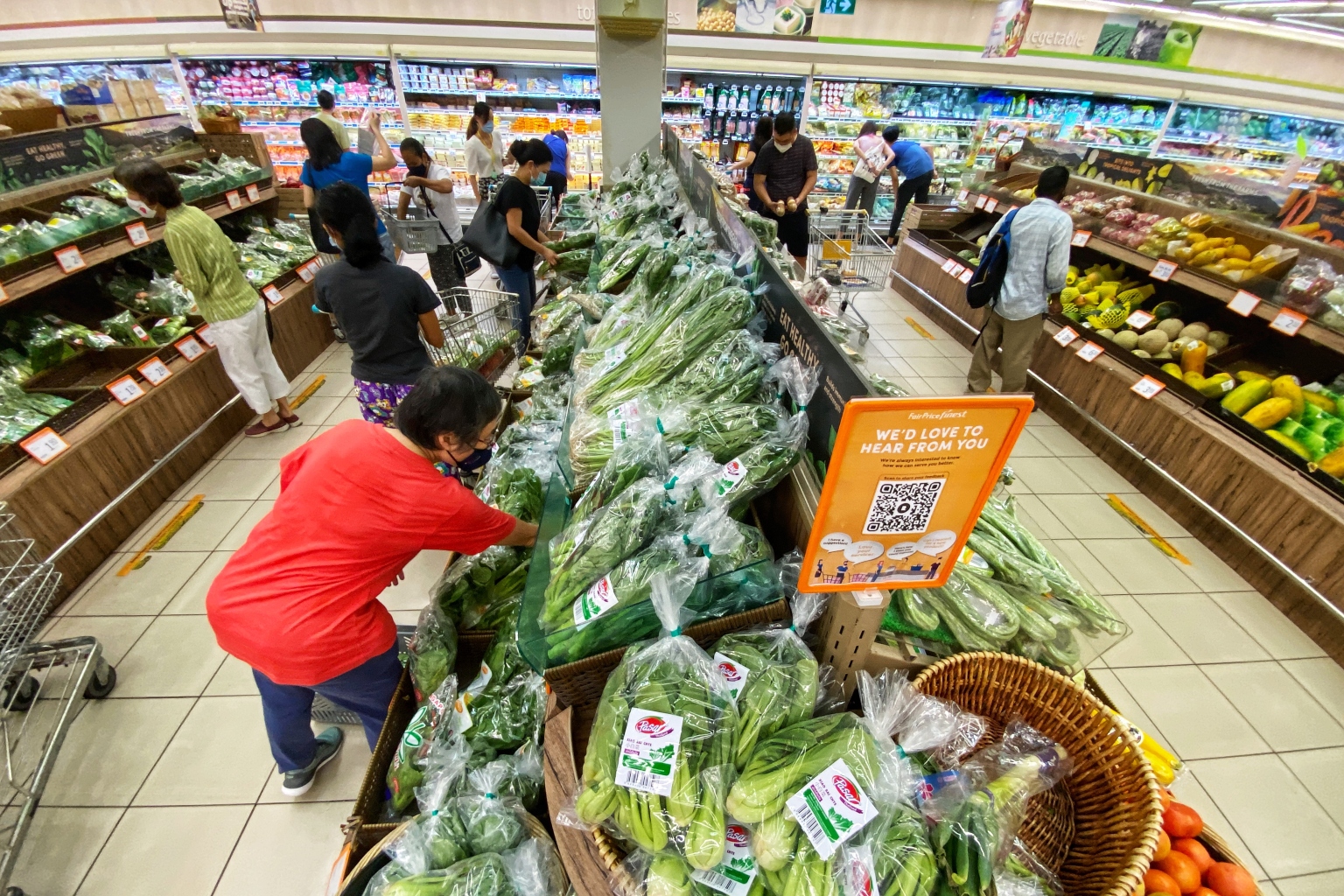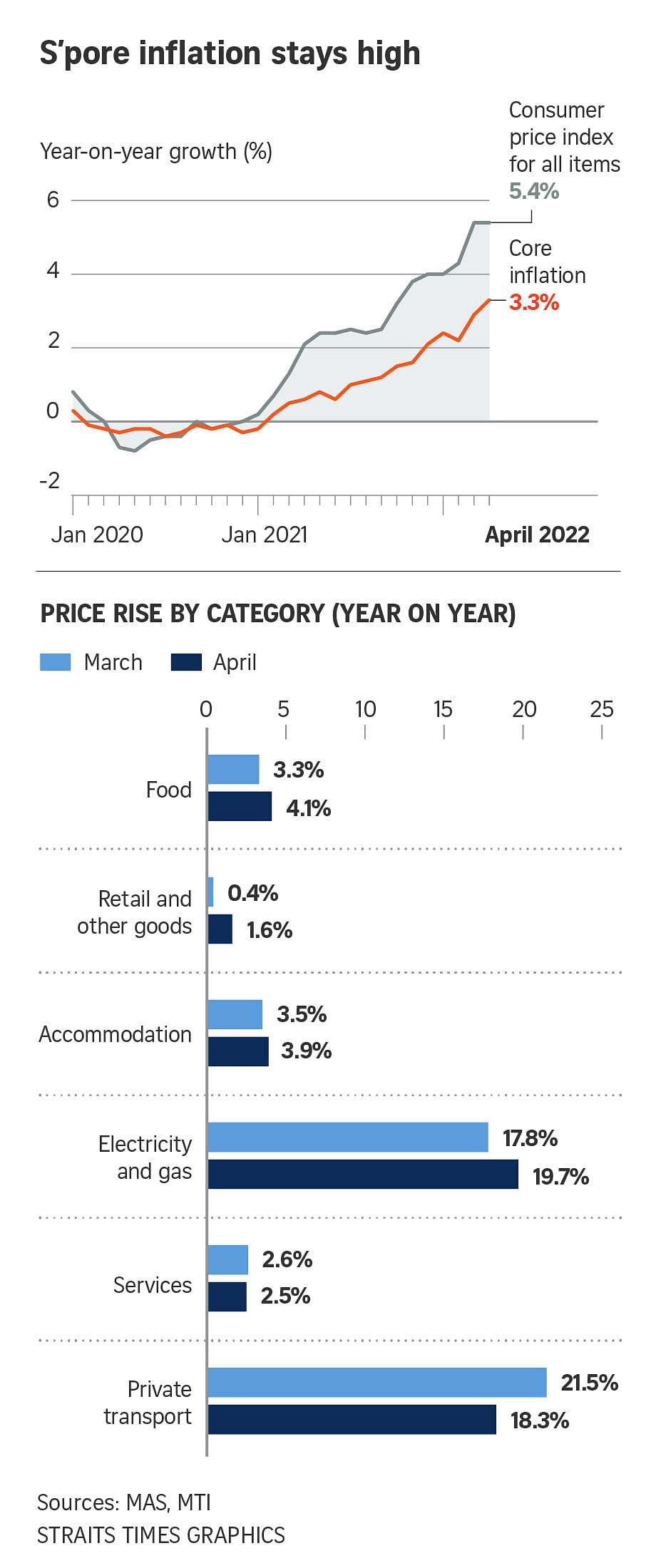Singapore's core inflation hits 3.3% in April, fuelled by hikes in electricity and gas tariffs
Sign up now: Get ST's newsletters delivered to your inbox

April's overall inflation came in at 5.4 per cent year on year, unchanged from March.
ST PHOTO: DESMOND WEE
Follow topic:
SINGAPORE - Singapore’s core inflation jumped in April to the highest level since February 2012, fuelled by higher inflation for electricity and gas, as well as food and other goods, with some analysts expecting the central bank to tighten monetary policy in October.
The core inflation rate, which excludes accommodation and private transport costs, rose to 3.3 per cent year on year in April, up from 2.9 per cent in March.
The Monetary Authority of Singapore (MAS) and the Ministry of Trade and Industry (MTI) said core inflation is forecast to pick up further in the coming months, before moderating towards the end of the year as some of the external inflationary pressures recede.
For this year, core inflation is projected to average 2.5 per cent to 3.5 per cent, they said.
OCBC Bank’s chief economist Selena Ling expects core inflation to breach the 4 per cent year-on-year mark from June, while headline inflation will hover above the 5 per cent year-on-year increase for the foreseeable future.
Still, she said it is unclear if core inflation will overtake headline inflation at this juncture.
Ms Ling said there is still room for another tightening of monetary policy in October, with possibly more targeted fiscal measures forthcoming to assist lower-income households and vulnerable individuals with their cost-of-living issues.
The core inflation rate, which excludes accommodation and private transport costs, rose to 3.3 per cent year on year in April, up from 2.9 per cent in March.
The Monetary Authority of Singapore (MAS) and the Ministry of Trade and Industry (MTI) said core inflation is forecast to pick up further in the coming months, before moderating towards the end of the year as some of the external inflationary pressures recede.
For this year, core inflation is projected to average 2.5 per cent to 3.5 per cent, they said.
OCBC Bank’s chief economist Selena Ling expects core inflation to breach the 4 per cent year-on-year mark from June, while headline inflation will hover above the 5 per cent year-on-year increase for the foreseeable future.
Still, she said it is unclear if core inflation will overtake headline inflation at this juncture.
Ms Ling said there is still room for another tightening of monetary policy in October, with possibly more targeted fiscal measures forthcoming to assist lower-income households and vulnerable individuals with their cost-of-living issues.
Maybank said it expects MAS to maintain the current tighter stance and steeper slope at the October meeting, following the aggressive tightening move in April, unless inflation surprises further on the upside.
“We think monetary policy may not be sufficient to contain the intensifying inflationary pressures, nor ease the tightness in the labour market. The Government may have to provide a supplementary budget to ease the burden from the rising costs of living, especially food and utilities costs,” the bank added.
IG market strategist Yeap Jun Rong said the April readings that are slightly below expectations might bring some short-term relief that the MAS’ recent policy tightening has helped limit price increases.
“After the aggressive tightening last month, any near-term moves from MAS may seem unlikely for now, and a wait-and-see stance may play out into the third quarter,” he said.
The peak in core inflation comes even as April’s overall inflation, or headline consumer price index, came in at 5.4 per cent year on year, a tad below the Bloomberg consensus of 5.6 per cent.
“We think monetary policy may not be sufficient to contain the intensifying inflationary pressures, nor ease the tightness in the labour market. The Government may have to provide a supplementary budget to ease the burden from the rising costs of living, especially food and utilities costs,” the bank added.
IG market strategist Yeap Jun Rong said the April readings that are slightly below expectations might bring some short-term relief that the MAS’ recent policy tightening has helped limit price increases.
“After the aggressive tightening last month, any near-term moves from MAS may seem unlikely for now, and a wait-and-see stance may play out into the third quarter,” he said.
The peak in core inflation comes even as April’s overall inflation, or headline consumer price index, came in at 5.4 per cent year on year, a tad below the Bloomberg consensus of 5.6 per cent.
The overall inflation remained unchanged from March as the jump in electricity and gas prices, as well as food and retail, was offset by a moderation in private transport inflation, which hit 18.3 per cent in April. This was lower than the 21.5 per cent in March, led by a smaller increase in car prices.
Electricity and gas prices jumped by 19.7 per cent year on year in April, up from 17.8 per cent in March, due to larger hikes in electricity and gas tariffs.
Also on the rise was food inflation, which hit 4.1 per cent in April from a year ago, as the prices of non-cooked food and food services rose at a faster pace.
Accommodation inflation in April edged up to 3.9 per cent year on year, alongside a stronger pace of increase in housing rents.
MAS and MTI warned that external inflationary pressures continue to be strong amid elevated global commodity prices, as well as ongoing supply chain frictions driven by both the Russia-Ukraine conflict and the regional pandemic situation.
In the near term, heightened geopolitical risks and tight supply conditions will keep crude oil prices elevated, they said.
Also on the rise was food inflation, which hit 4.1 per cent in April from a year ago, as the prices of non-cooked food and food services rose at a faster pace.
Accommodation inflation in April edged up to 3.9 per cent year on year, alongside a stronger pace of increase in housing rents.
MAS and MTI warned that external inflationary pressures continue to be strong amid elevated global commodity prices, as well as ongoing supply chain frictions driven by both the Russia-Ukraine conflict and the regional pandemic situation.
In the near term, heightened geopolitical risks and tight supply conditions will keep crude oil prices elevated, they said.
They added that prices of other commodities, such as food, are also expected to stay high amid supply-demand mismatches, as well as bottlenecks in global transport and regional supply chains.
Consumer price inflation for the year is forecast to come in between 4.5 per cent and 5.5 per cent, said MAS and MTI.
Maybank said it expects private transport prices to remain elevated as fuel pump prices climbed to a new high in May, despite the recent dip in global oil prices.
To ease the situation, it said the Government might have to consider reviewing its stricter foreign labour policies, and delaying the introduction of the local qualifying salary, as well as the expansion of the progressive wage model to the retail sector in September this year.
Consumer price inflation for the year is forecast to come in between 4.5 per cent and 5.5 per cent, said MAS and MTI.
Maybank said it expects private transport prices to remain elevated as fuel pump prices climbed to a new high in May, despite the recent dip in global oil prices.
To ease the situation, it said the Government might have to consider reviewing its stricter foreign labour policies, and delaying the introduction of the local qualifying salary, as well as the expansion of the progressive wage model to the retail sector in September this year.


